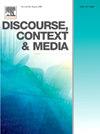Sharing as informal teaching: Identity construction of an English learner/teacher microcelebrity on Douyin
IF 3.1
2区 文学
Q1 COMMUNICATION
引用次数: 0
Abstract
Previous research has demonstrated that informal language learning and teaching activities occur through user-generated content on popular video-sharing platforms. As individuals can claim varying degrees of authority in the knowledge they transmit to others, the identity constructions relevant to digital knowledge production represents a topic that demands more scholarly attention from a discursive, social, as well as pedagogical perspective. To address this issue, this paper takes a case study approach to exploring the self-presentation of a popular Tibetan content creator on Douyin, Jiadecang, who shares short English language learning vlogs featuring himself practicing spoken English that are designed to attract followers. Taking a social semiotic approach to the analysis of multimodal discourse (Bezemer and Jewitt, 2025, Kress, 2010, Kress and van Leeuwen, 2006), this study investigates how Jiadecang harnesses various linguistic and other semiotic resources afforded by the platform to engage in public identity construction in his videos. By projecting identities of both learner and “teacher” simultaneously, Jiadecang attracts followers interested in learning English and, at the same time, is protected from potential critiques by others about his “imperfect” English. This study adds to a growing body of research on digital genres, self-branding practices, and influencer cultures.
作为非正式教学的分享:抖音英语学习者/教师微名人的身份建构
之前的研究表明,非正式的语言学习和教学活动是通过用户在流行的视频分享平台上生成的内容进行的。由于个人可以在他们传递给他人的知识中声称不同程度的权威,与数字知识生产相关的身份结构代表了一个从话语、社会和教学角度需要更多学术关注的主题。为了解决这个问题,本文采用案例研究的方法来探索抖音上一位受欢迎的藏语内容创作者“加德堂”的自我展示,他分享了自己练习英语口语的短视频,旨在吸引粉丝。本研究采用社会符号学方法分析多模态话语(Bezemer and Jewitt, 2025; Kress, 2010; Kress and van Leeuwen, 2006),研究贾德康如何利用平台提供的各种语言和其他符号学资源,在其视频中参与公共身份建构。通过同时突出学习者和“老师”的身份,嘉德堂吸引了对英语学习感兴趣的追随者,同时也避免了别人对他“不完美”英语的批评。这项研究增加了对数字类型、自我品牌实践和影响者文化的研究。
本文章由计算机程序翻译,如有差异,请以英文原文为准。
求助全文
约1分钟内获得全文
求助全文

 求助内容:
求助内容: 应助结果提醒方式:
应助结果提醒方式:


